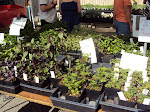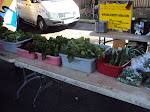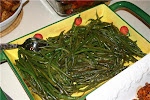Food and Health
In the food world, the people with power are the ones who affect what and how and where and why we eat. They're the agribusiness moguls who decide what gets grown and how it gets harvested and sold; the representatives of major food processing, distribution concerns, and retail food outlets who create new products and service the demand for edibles old and new. They're also the consumer advocates — who tell us what we should and shouldn't eat, sometimes upending whole industries in the process. http://www.thedailymeal.com/50-most-powerful-food-folk-america-for-2011
Guess what – traffic light labels work. Investigators measured sales before the start of the intervention. About a quarter of items sold were in the red category and 42% were green—these hospital workers were already making healthy choices. The intervention took place in two 3-month phases. The first phase just involved traffic light labels. In the second phase, the investigators moved the items around to make the green-labeled products more visible and accessible. http://www.foodpolitics.com/
This time of year the options in fresh produce are limited, SupermarketGuru wants to remind you of some thrifty ways of filling up on nature’s bounty. Generally winter vegetables and fruits include, root vegetables such as: parsnips, rutabagas, potatoes, beets, citrus fruits like blood oranges, kumquats, and clementines. Winter is also the time for Brussels sprouts and jicama. http://www.supermarketguru.com/index.cfm/go/sg.viewArticle/articleId/2767
A new study of women ages 18 to 44 found that drinking coffee and other caffeinated beverages can alter levels of estrogen.
http://well.blogs.nytimes.com/2012/01/27/caffeine-alters-estrogen-levels-in-younger-women/?ref=health
Food Assistance
Hoping to combat the growing problem of childhood obesity, the Obama administration on Wednesday announced its long-awaited changes to government-subsidized school meals, a final round of rules that adds more fruits and green vegetables to breakfasts and lunches and reduces the amount of salt and fat.
http://www.nytimes.com/2012/01/26/us/politics/new-school-lunch-rules-aimed-at-reducing-obesity.html?_r=1&ref=health
A Georgia DA says there may be a culture in Dougherty County that it's OK to lie on application forms and receive free school lunch for your students. But he says those free lunches days are over. He says his office and school police will audit the lunch program now, and he will prosecute violators.
http://www.walb.com/story/16589030/d-a-to-vet-free-school-lunch-applications
A Kansas House committee will question a state official next week about a new policy that reduced or ended food stamp benefits to hundreds of U.S.-born children of illegal immigrants.
http://www.dodgeglobe.com/newsnow/x675926940/House-panel-to-examine-food-stamps-policy
Food Safety
The scathing review by the Department of Health and Human Services found that the safety of the nation's food supplies was compromised because FDA did not always follow its own guidelines to properly handle recalls.
http://money.cnn.com/2011/06/23/news/economy/food_safety_recalls_fda/index.htm
Thursday, a Colorado House committee gave its unanimous support to a cottage food bill. If enacted, the bill would allow the sale of "nonpotentially hazardous" food from home kitchens.
http://www.foodsafetynews.com/2012/01/cottage-food-bill-gets-public-hearing-in-colorado/
Dietary levels of acrylamide, the chemical compound and known carcinogen naturally produced from cooking food, cannot be shown to pose any health risk to humans.
http://www.foodsafetynews.com/2012/01/panel-acrylamide-in-food-unlikely-to-pose-health-risk/
Park City Group President Randy Fields addressed food safety regulations in America at a Food and Drug Law Institute conference in Washington, D.C., Thursday, January 26, 2012. Fields was invited to speak to FDA officials, attorneys and industry experts for a registry the Park City Group developed that would track food from farm to fork. http://www.parkrecord.com/rss/ci_19837579?source=rss
Chlorine is a commonly used tool of the fresh-cut produce industry to prevent cross-contamination in the wash flume. But a high organic load, as is common in fresh-cut produce, reduces the efficacy of chlorine by using up free chlorine. A new chlorine stabilizer called SmartWash from New Leaf Food Safety Solutions, Salinas, Calif., could improve food safety during the wash and transport through the cutting room.
http://freshcut.com/index.php/food-safety/entry/chlorine-stabilizer-shows-promise-in-wash-environment
This year promises to be a noteworthy year in food safety. The regulatory outlook for 2012 is dominated by the Food Safety Modernization Act (FSMA), and July will be a particularly important month for food safety, as many important provisions of FSMA either become effective or require regulations to be implemented at that time.
http://www.foodprocessing.com/articles/2012/fda-safety-outlook-2012.html
What’s happening with plant-based meat: a roundup
23 hours ago

























































































No comments:
Post a Comment